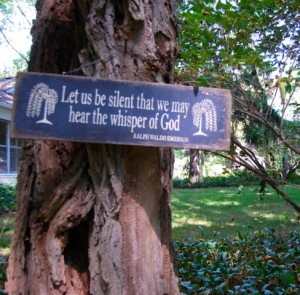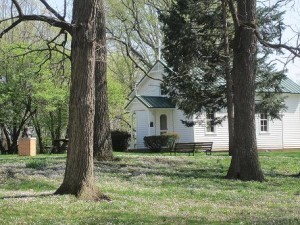Preview
This month’s issue includes a personal reflection written by a participant in our eight day mid-summer retreat, thought-starters from two people who will be serving as session leaders at our Fall Workshop on October 3, information about “Silent Saturdays” at Healing Gardens and a Merton Society jazz concert, insights from Carl Sagan, Fr. Thomas Keating, Lao Tzu, and W.H. Auden, and a link to the very interesting website of a “center for contemplative activism.”
We hope you’ll enjoy it and invite your participation. Please use the e-mail address at the end to send your feedback.
Reflection: Mid-Summer Intensive and Post-Intensive Retreat
by Al Krema
(The Portiuncula, July 19-27, 2015) Have you ever wondered what a Contemplative Outreach intensive and post intensive retreat is like? Have you ever considered attending one?
If you are familiar with centering prayer and have read the book Open Mind, Open Heart by Thomas Keating, you have some idea of Keating’s contribution to the 2000-year tradition of Christian mysticism, and how he applies the understanding of modern psychology to the traditional description of the transformation process that takes place during the journey of the mystical path.
Our Chicago chapter of Contemplative Outreach recently sponsored an eight-day intensive and post intensive retreat at the Portiuncula retreat center in Frankfort, IL. I attended this retreat along with 19 others and found it to be a source of growth and transformation, true to the promise of faithful practice in centering prayer. Initially, I had felt that the event seemed a bit daunting — requiring a full week off and spending that week in silence. I hesitated for some time before making the commitment to attend, and did so because it was so conveniently located in the Chicago area, at a facility that I knew was a wonderful place to be.
Let me give you an idea of what the week is like:
Seven nights and eight days are structured with prayer and learning, with time for walks in nature and reflection. With beginning and ending activity, there are seven days spent in silence. Our centering prayer together in the group consisted of a 30 minute period of meditation, a meditative walk, then another 30 minute period of meditation. We did this three times each day. We also had two learning sessions each day, which were focused on Keating’s teachings on the process of growth, with the dismantling of the “false-self system.” I had felt that I knew this material quite well, having worked with it for the last 15 years, but I was pleasantly surprised by how much seemed new and fresh based on having a focused time to spend with it and looking at it afresh from the place of my own growth stage at this present time.
Fall Workshop Thought-Starters

(Contemplative Outreach Chicago’s fourth annual Fall Workshop will take place Saturday October 3, 2015 at St. John of the Cross in Western Springs, Illinois. Full details and registration here.)
Below, Shawn Kafader and Judith Valente, two of our Fall Workshop session leaders, offer some initial thoughts on the ideas they plan to explore on October 3.
Archetypes in the Spiritual Journey
by the Rev. Dr. Shawn Kafader
Archetypes are psychological structures that are reflected in symbols, images and themes common to all cultures regardless of region, religion or time.
Archetypes are a vital part of the contemplative dimension of our spiritual journey. They set a path for the journey inward, allowing us to chart our own path and assist others in discovering their path.
This interactive workshop, will reflect on an evolutionary model of the eight spiritual archetypes, as presented by Fr. Thomas Keating. Together we will explore the Pre-Rational, Mythic Membership, Intuitive, and Unitive levels of consciousness with the Archetypes that relate to each level. We will be invited to open our minds and hearts to the ever deepening spiritual journey while learning to name and integrate – for ourselves and others – these universal archetypes that emerge in our practice of contemplative prayer.
The Art of Pausing: Lessons from Thomas Merton and Monasteries
by Judith Valente
The other day my husband showed me a cartoon he saw on the Internet. In the first frame, you see a fellow looking around and he says, “What a busy world! In the next five minutes I will do nothing.” The man is silent for the next two frames. Then he looks up and says, “Maybe I should tweet about this.”
In four short frames, that little cartoon sums up the conundrum of life in the age of Twitter, cell phones, email, Facebook and all the other white noise and distractions that infiltrate our days. I believe at the center of each one of us there is a point of being that longs for moments of silence and solitude when we can simply be.
Like many people, I suffer from a dual diagnosis. It’s called workaholism and over-achieverism. For eight years, I worked as a correspondent for The Wall Street Journal: six years in the Chicago bureau and two years in London. In London, we had an office on the 10th floor and I was fortunate enough to have a desk by a window overlooking St. Paul’s Cathedral. I’d arrive for work around nine in the morning, turn on the computer and promptly bury myself in the news wires and make phone calls to flesh out my story for the day. Inevitably at some point, I’d look out the window and it would be dark. The day had passed and I’d missed it.
“Silent Saturdays” Coming Up in September and October at Healing Gardens
 Take some sacred time for yourself to pray and reflect in a welcoming group setting, September 19 and/or October 17 at the lovely Healing Gardens, a two-acre expanse of woodland and perennial gardens in Saint Charles, Illinois. Each morning will consist of two, 20 minute meditation periods; a guided meditation walk in nature; silent reflection time; journaling and optional sharing. Drinks and snacks are provided; the cost is $20 per person. Further information and registration at the Healing Gardens website.
Take some sacred time for yourself to pray and reflect in a welcoming group setting, September 19 and/or October 17 at the lovely Healing Gardens, a two-acre expanse of woodland and perennial gardens in Saint Charles, Illinois. Each morning will consist of two, 20 minute meditation periods; a guided meditation walk in nature; silent reflection time; journaling and optional sharing. Drinks and snacks are provided; the cost is $20 per person. Further information and registration at the Healing Gardens website.
All That Merton Society Jazz
The Chicago Chapter of the International Thomas Merton Society is sponsoring a very special concert at 3:00 p.m. Sunday, September 20, featuring a jazz performance by vibraphonist Dick Sisto and guitarist John Moulder, with Dick sharing reminiscences of his friendship with Thomas Merton, who he got to know in 1967-68. “I think this melding of music and remembrance is something Merton would have really appreciated,” says Mike Brennan of the Merton Society. The performance will be held at St. Gregory the Great Church, 5545 N. Paulina, Chicago. There is a $15 admission (cash or check) which will be collected at the door.
Insights
Science is not only compatible with spirituality, it is a profound source of spirituality.
Carl Sagan
Bring the same emptiness and freedom to each moment and its content. Then you will be happy even in the midst of suffering. Accept everything and everyone just as they are, where they are, and try to act as lovingly as possible in every situation. Be ready to be led you know not where or when. Hush the discriminating mind dividing things into good or evil for me.
Fr. Thomas Keating
When I let go of what I am, I become what I might be.
Lao Tzu
Both in the substance and the parabolic method of his teaching about love, Jesus never asks anyone to accept anything except on the basis of their personal experience of human love… In speaking of the fatherhood of God, Jesus is teaching that God does not love us because we are ‘good’ or because he is very ‘good’ and merciful but because he has to, because we are part of him, and he can no more hate us if we act badly than a man can hate one of his fingers when it aches: he can only want it to get well.
W.H. Auden
Website to Explore: Gravity
Gravity, in Omaha Nebraska, describes itself as a Center for Contemplative Activism, which exists to nurture the integral connection between mysticism and activism. “Gravity grounds social engagement in Christian contemplative spirituality, to do good better by facilitating contemplative retreats, spiritual direction and pilgrimage to places of religious significance as well as places marked by profound pain and hope.”
The center’s beautifully designed website includes basic information about 11 contemplative practices (centering prayer, examen, breath prayer, etc.), a thought-provoking blog, a recommended “starter library for contemplative activists,” and several other interesting features. It’s definitely worth a look.
Your Turn
Do you have a reaction to any of the items in this month’s newsletter? An upcoming event you think other contemplatives should know about? An inspirational quote you’d like to share? A book, website, podcast, or video to recommend? If so, please contribute by emailing the newsletter editor at jack.lloyd@earthlink.net.
